How long can you go without talking?
It doesn’t sound like much of a superpower, but Black Bolt holds the record in comic books. Stan Lee and Jack Kirby created him back in 1965 (Fantastic Four #45), and aside from a few mountain-splitting whispers, the guy has barely parted his lips.
For Supreme Court Justices, the verbal self-restraint prize goes to Clearance Thomas.
“One of the abiding mysteries at the Supreme Court,” writes Adam Liptak for The New York Times, “is why Justice Clarence Thomas has failed to say a word in almost seven years of arguments.” Theories include self-consciousness (Thomas was teased about his Georgia accent growing up), intimidation (he didn’t speak in his Yale law school classes either), and courtesy (to his fellow Justices whose noise level he likens to Family Feud).
Black Bolt is less of a mystery. My wife gave me Men and Cartoons for Christmas, so I’ll invite Jonathan Lethem to the lectern:
Black Bolt wasn’t a villain or a hero. Black Bolt was part of an outcast band of mutant characters known as the Inhumans, the noblest among them. He was their leader, but he never spoke. His only demonstrated power was flight, but the whole point of Black Bolt was the power he restrained himself from using: speech. The sound of his voice was cataclysmic, an unusual weapon, like an atomic bomb. If Black Bolt ever uttered a syllable the world would crack in two.
Black Bolt grew up in a sound-proof chamber, not rural Georgia, but he is also a member of the Illuminati, the closest thing in the Marvel universe to the Supreme Court. Thomas shares his bench with eight Justices; Black Bolt only five (Reed Richards, Dr. Strange, Professor X, Tony Stark, and Namor), but both supergroups are the endpoint of an ultimate check-and-balance system.
They always get the last word.
Black Bolt even passes judgment on U.S. legislation. He rejected the Superhuman Registration Act (AKA the Patriot Act) in 2006 (also the year Thomas last spoke in court) and refused to get involved in the ensuing “Civil War,” monitoring it from afar instead. As Lethem explains, “Black Bolt was leader in absentia much of the time—he had a tendency to exile himself from the scene, to wander distant mountain tops contemplating . . . What? His curse? The things he would say if he could safely speak?”
Aside from a few whispered remarks audible only to Breyer and Scalia seated beside him, Thomas has gone seven years without a single word. Until this winter. During a discussion of the qualifications of a Harvard-trained defense attorney, the Black Bolt of the Supreme Court leaned forward and said into his microphone:
“Well — he did not — .”
The earth did not split in two.
But opinion did. Some witnesses say he was making a joke, a reference to whether a degree from Harvard could be considered proof of incompetence. Or was he referring to his own alma mater, Yale? Either way, court transcripts indicate laughter followed. Seven years of silence and then a one-liner. But if it was just a joke, why did the lawyer at the lectern try to refute his point? Whatever that point may have been? And since the broader issue was the minimum qualifications for a death penalty defense lawyer, who exactly was laughing?
When Black Bolt breaks his vow of silence, the results are usually much louder. Remember when he used his voice to free the Inhuman’s city of Attilan from the Negative Zone? Or stunned Spider-Man’s alien Venom costume after it merged with Thor, allowing Black Cat to kill it in revenge for Peter Parker’s death? (Though, okay, that’s from What If?, so technically it never happened.)
We never know exactly what Black Bolt says in his super-speeches. Maybe he just likes to crack jokes. If so, no microphone can record them. But the last time Thomas deployed his nation-splitting voice, every network in the country televised it.
Remember how he pronounced the L-bomb, declaring his 1991 confirmation hearing a “high-tech lynching,” and categorically denied Anita Hill’s allegations of sexual harassment? Remember the joke he cracked to her about the pubic hair on his Coke can? Now THAT was funny.
Of course the Senate confirmed him, so technically that didn’t happen either.
So let’s hear it for judicious self-restraint.Like Black Bolt, the Justice understands his own destructive vocal power and so has learned to hold his super-tongue. If he stays on schedule, we won’t hear another joke till 2020.
‘Nuff said.

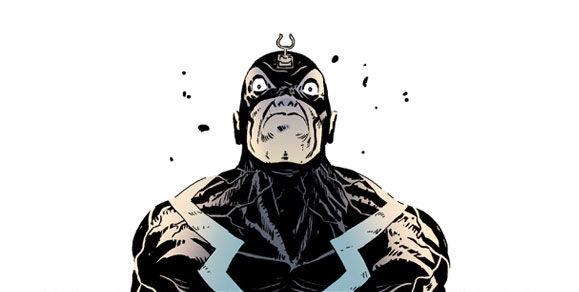
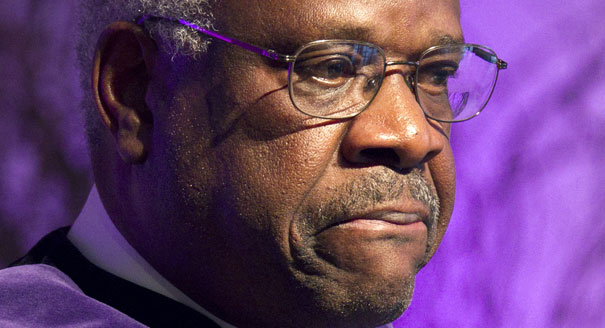
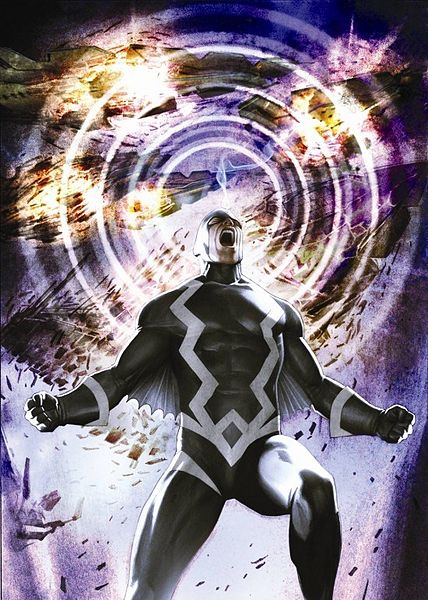
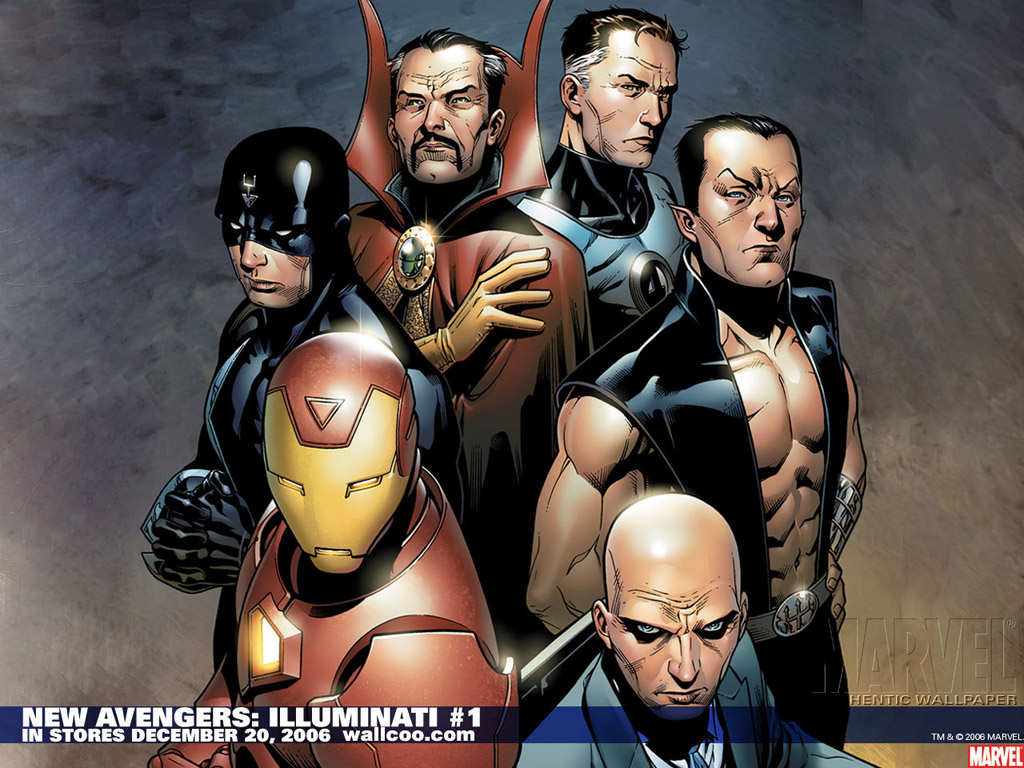
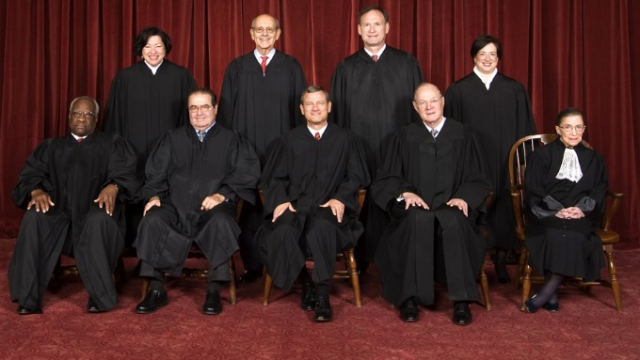
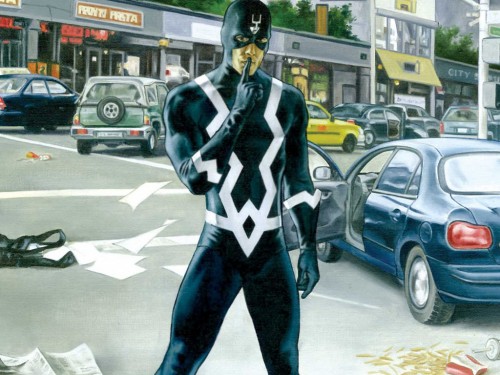
Chris,
Thomas Brennan, Thurgood Marshall, and Harry Blackmun were similarly quiet justices, for whatever reason. During oral arguments, the justices constantly interrupt the attorneys. I’ve heard somewhere (NPR, I think) that it grates on Thomas’s rural Georgia manners, so he refuses to engage in it.
He is a vocal opinion author, however. He has at times written dissenting opinions even when his side won, because he occasionally disagrees with the legal argument of the majority despite agreeing with their conclusion. He wants what he believes to be the correct legal argument in the record. I’m glad he’s there, articulately arguing the textualist and originalist points of view, which for years were underrepresented on the court.
Neither of us will ever really know what he said to Anita Hill. However, there was exceptionally strong testimony that contradicted Hill’s, from women who worked in the same organizations and in at least one case, the same office with Thomas and Hill. Due to the nature of their work, several of them were experts on the topic of sexual harassment. Some had been victims of sexual harassment by previous employers. These women not only testified to an absence of sexual harrassment, they also affirmed Thomas’s respect for women, gender issues, and propriety in the workplace, which they claim to have witnessed in word and in deed (http://www.c-spanvideo.org/videoLibrary/transcript/transcript.php?programid=107905). To my knowledge, there was no testimony that directly supported Hill’s allegations. In a system that purportedly begins with a presumption of innocence, the outcome was predictable.
In not-really-related news, Captain America has recently joined the Illuminati. Previously an advocate of restraint, he has “evolved” judicially and now urges activism from the bench in the face of a threat to the court’s jurisdiction. Justice Xavier is reportedly dead — or as they say in the Illuminati, on sabbatical. Unlike the Supreme Court, death does not end one’s term in the Marvel Universe. The Black Panther (more specifically, T’Challa) originally turned down an appointment but has now brought a case before the court. He may yet join the bench in a flagrant conflict of interest.
John, you seem to know more than me about the Supreme Court AND the Illuminati. I’m not a Thomas fan (obviously), but I appreciate your insights. Doesn’t the presumption of innocence apply only to criminal prosecution? The bar for receiving what is arguably the most elite and the only permanently tenured position in the U.S. government should be a bit higher. We will indeed never know what happened between Thomas and Hill. The fact that other folks testified that they personally were not harassed by him and did not witness him harassing anyone else, doesn’t really tell us anything either. But it’s an issue that allows for vast areas for reasonable disagreement. Justice T’Challa’s conflict of interest, however, is pretty clean cut.
” To my knowledge, there was no testimony that directly supported Hill’s allegations.”
I think this is a little misleading. My understanding is that there were several women who were willing to testify that they had also been harassed…but that the committee refused to hear them for essentially political reasons (that is, the Republicans didn’t want to, and the Democrats didn’t want to piss the Republicans off.)
Here’s the quote from Wikipedia.
“However, there was exceptionally strong testimony that contradicted Hill’s, from women who worked in the same organizations and in at least one case, the same office with Thomas and Hill. ”
Citation?
This is most categorically not the case. If Bill Clinton can be legitimately be considered a serial harraser due to multiple independent witnesses, then by that standard so can Clarence Thomas. Like Jeffrey Toobin stated:
“Still, a good deal of evidence has since emerged about the protagonists and their testimony. Even near the end of the hearings, several other women who had worked for Thomas were prepared to testify and corroborate Hill’s testimony that Thomas had a history of making female subordinates uncomfortable with personal and sexual talk. The group included Angela Wright, Rose Jourdain, and Sukari Hardnett; other associates of Thomas, among them Kaye Savage and Fred Cooke, would have testified about the nominee’s long-standing interest in pornography, which would have corroborated Hill’s account.”
“…This year, Lillian McEwen, a Washington lawyer who had a long-term romantic relationship with Thomas before he met Ginni, published a memoir, “D.C. Unmasked & Undressed.” She, too, remarked on the Justice’s “strong interest in pornography,” and she also said that Thomas scrutinized his work colleagues as prospective sexual partners. In short, virtually all the evidence that has emerged since the hearings corroborates Hill’s version of events….”
Good point bringing up Bill Clinton. It’s amazing to me that that duplicitous, unprincipled scumbag is now so universally admired. Time erases all, I guess.
Noah, I clearly didn’t do enough research, and I apologize. Now having done a little more, the picture is obviously muddier than I presented it. As you point out, there were apparently witnesses supporting Anita Hill who didn’t make it to the stands. Eventually, there were even vitriolic exposés undercutting claims on both sides.
steven, my source was the Clarence Thomas wikipedia entry, even though I should know better. It was well footnoted, but apparently the material from those sources was carefully chosen. Here’s the paragraph:
Hill was the only person to testify at the Senate hearings that there had been unsolicited sexual advances.[63] Angela Wright, who worked under Thomas at the EEOC before he fired her,[64] decided not to testify,[65] but submitted a written statement alleging that Thomas had pressured her for a date and had made comments about the anatomy of women. However, she said she did not feel his behavior was intimidating nor did she feel sexually harassed, though she allowed that “Some other women might have”.[66][67][68] Also, Sukari Hardnett, a former Thomas assistant, wrote to the Senate committee saying that although Thomas had not harassed her, she did feel that he had inspected her as a female.[69][70]
My thanks to Noah for also using Wikipedia, so at least I’m in good company.
I still argue that the testimony in support of Thomas was compelling. The women who testified were natural opponents of sexual harassment in the workplace by virtue of their professional expertise and personal experience. They knew Thomas’s behavior in the workplace, and they portrayed him as the antithesis of the person he is accused of being. That said, I now see that they were in contradiction to more voices than just Anita Hill’s.
Chris, I agree that Senate confirmation is not a trial in the judicial sense, although a trial it can certainly be. It does share such aspects as legally binding testimony and the involvement of too many attorneys. I also agree that the standard for employment in the highest offices of our land should be higher than the standard for acquittal. But the presumption of innocence or the benefit of the doubt has a place in those decisions also. An accusation is a starting point for investigation. It should not be enough by itself to deny someone a position. That motivates false accusations, and no professor who had ever failed a student would ever get tenure. So where’s the line? I think every individual decides in those situations who is credible. We try to be the “reasonable man or woman” to whom jurisprudence refers, but I think our biases inevitably come into play.
It’s interesting that steven brought up Bill Clinton (and Noah echoed it). It occured to me as I was reading Chris’s point about standards that we elected and re-elected a President who was accused of multiple counts of sexual harassment and other misconduct over a period of years, extending back into his governorship. Some who voted for him believed that the accusations were false and motivated by money, fame, or politics. I think many more simply decided that it didn’t matter whether they were true. Lecher or saint, Bill Clinton was the man they wanted in the Oval Office, at least given the options available. I understand that choice, but I don’t agree with it. I think when we disregard such behavior and say it doesn’t matter, we’re saying the victims don’t matter or the crime isn’t real. At least in the Thomas hearings, the Senate expressed that it matters whether these things happened or not. Nobody said, “That’s not relevant to the job.”
After Anita Hill’s testimony, sexual harassment and acceptable workplace behavior were hot topics. That probably did some good. But based on my workplace experiences and those of people I care about, it may be time for another national discussion. Thanks for listening to me and speaking courteously with me even though I showed up with different biases (and should have done more homework).
steven, I just realized you were asking for a different citation than I answered. The link in my first long comment leads to a transcript of the testimony from “Thomas Second Hearing Day 3, Part 6 – Oct 13, 1991.” It’s testimony by eight women in total, all of whom worked closely with Thomas, and most of whom also knew Hill. Nancy Altman was the one who shared an office with them for two years. Here’s the link again: “http://www.c-spanvideo.org/videoLibrary/transcript/transcript.php?programid=107905”
I just thought that was a really good article and I’m making my high school students read it for our comics unit. Thanks!
————————
Noah Berlatsky says:
Good point bringing up Bill Clinton. It’s amazing to me that that duplicitous, unprincipled scumbag is now so universally admired. Time erases all, I guess.
————————–
It helps when you’re followed in the White House by Dubya; who wouldn’t look world-class in comparison?
(See http://archive.truthout.org/article/sean-wilentz-the-worst-president-history )
As for Clarence Thomas, I’d like to send him back to America in the 18th Century and see how he likes life under the “originalist” Constitution, before its purity was sullied by stuff like the 13th Amendment…